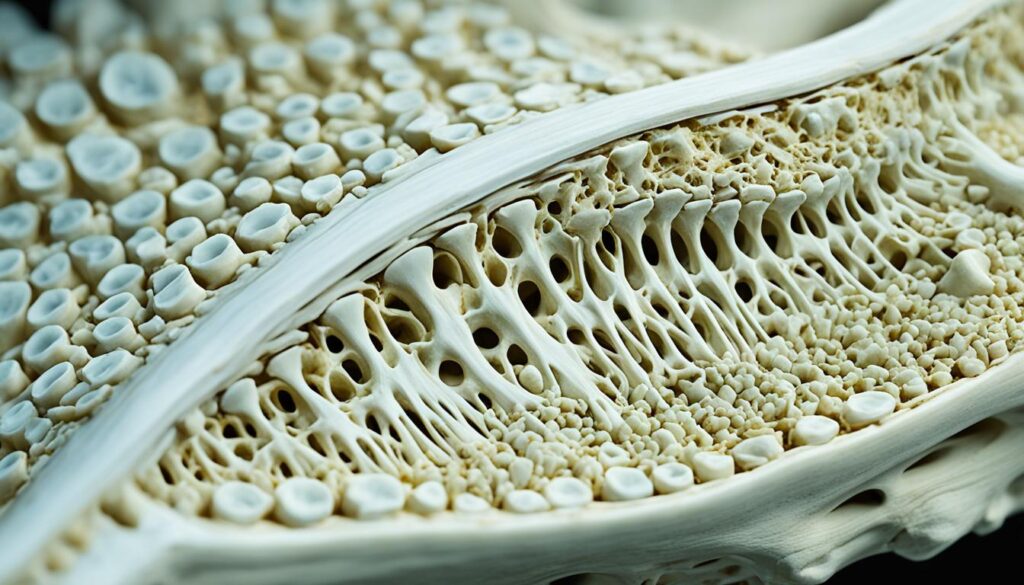Did you know that the skeletal system accounts for about 20% of your total body weight? That’s right, your bones provide crucial support and protection for your body. Taking care of your bone and joint health is essential for overall orthopedic well-being and musculoskeletal wellness.
Protecting your bones and joints is important at every stage of life. Your bones not only provide structure but also anchor muscles, protect organs, and store calcium for various bodily functions. Ensuring strong and healthy bones can help prevent conditions like osteoporosis and maintain optimal mobility and flexibility.
There are several factors that can affect your bone and joint health, including diet, physical activity, and lifestyle choices. By incorporating the right strategies, such as a balanced diet, regular exercise, and proper supplementation, you can optimize your bone and joint health for lasting musculoskeletal wellness.
Key Takeaways:
- Strong and healthy bones are crucial for overall orthopedic health and musculoskeletal wellness.
- Your skeletal system provides support, protects organs, anchors muscles, and stores calcium.
- Factors like diet, physical activity, and lifestyle choices can significantly impact bone and joint health.
- A balanced diet, regular exercise, and proper supplementation are key elements in optimizing bone and joint health.
- By taking care of your bone and joint health, you can prevent conditions like osteoporosis and maintain optimal mobility and flexibility.
The Importance of Bone Health
Bone health plays a vital role in our overall wellbeing. Our bones are constantly undergoing a process of renewal, with new bone being formed and old bone being broken down. During childhood and adolescence, the body builds bone mass rapidly, reaching its peak around the age of 30. However, after this point, more bone is lost than gained, resulting in a decrease in bone mass.
The risk of developing osteoporosis, a condition characterized by weak and brittle bones, depends on the amount of bone mass attained by the age of 30 and the rate of bone loss thereafter. Various factors can affect bone health, including calcium intake, physical activity levels, tobacco and alcohol use, sex, body size, age, race, family history, hormone levels, eating disorders, certain medications, and other health conditions.
In order to prevent the onset of osteoporosis and maintain musculoskeletal wellness, it is essential to take steps to maintain bone health throughout life. This includes ensuring an adequate intake of calcium, engaging in regular physical activity, managing risk factors such as menopause and hormone levels, and being aware of the potential impact of medications on bone health.
By prioritizing bone health, individuals can prevent the loss of bone mass, reduce the risk of fractures, and maintain strong and healthy bones throughout their lives. Investing in bone health is an investment in overall wellbeing and quality of life.
Enhancing Bone Health Through Diet
A balanced diet plays a crucial role in promoting bone health. Calcium and vitamin D are two key nutrients that are essential for maintaining strong and healthy bones. Calcium is responsible for bone strength and density, while vitamin D is crucial for calcium absorption in the body.
Adults under 50 and men aged 51-70 should aim for a daily intake of 1,000 mg of calcium, while women over 50 and men over 71 should aim for 1,200 mg. Including calcium-rich foods in your diet can help you meet these requirements. Good sources of calcium include dairy products, such as milk, cheese, and yogurt, as well as almonds, broccoli, kale, canned salmon with bones, sardines, and soy products like tofu.
If it’s challenging to meet the recommended intake of calcium through diet alone, calcium supplements may be recommended by a healthcare professional. These supplements can provide an additional source of calcium to support bone health.
In addition to calcium, vitamin D is also essential for optimal bone health. Adults aged 19-70 should aim for 600 IU of vitamin D daily, increasing to 800 IU for adults over 70. Food sources of vitamin D include oily fish, such as salmon and mackerel, eggs, fortified foods like breakfast cereals and orange juice, and sunlight exposure.
Maintaining adequate levels of both calcium and vitamin D is crucial for promoting optimal bone mineral density and reducing the risk of bone diseases like osteoporosis.
Note: Including a variety of calcium-rich foods in your diet and ensuring sufficient vitamin D intake can help optimize your bone health.
Exercise for Strong Bones and Joints
Regular exercise is essential for maintaining strong bones and joints. Engaging in physical activity helps stimulate bone formation, improve bone density, and promote overall joint health.
Weight-Bearing Exercises
Weight-bearing exercises are particularly beneficial for bone health. These exercises involve activities that make your bones work against gravity. They include:
- Walking: A simple and accessible exercise that helps build bone strength and improve bone density.
- Jogging/Running: Higher impact than walking, running also contributes to bone formation and overall bone health.
- Climbing Stairs: Stair climbing engages multiple muscle groups and stimulates bone growth, especially in the lower body.
By regularly incorporating weight-bearing exercises into your routine, you can enhance bone formation and increase bone density, leading to stronger bones and improved skeletal health.
Strength Training
In addition to weight-bearing exercises, strength training is crucial for supporting healthy bones and joints. Strength training exercises involve working against resistance to build muscle strength and provide extra support to the bones and joints. Some examples of strength training exercises include:
- Weightlifting: Using free weights or machines to target specific muscle groups and build muscle mass.
- Resistance Bands: Utilizing elastic bands to provide resistance during exercises and improve muscle strength.
By incorporating both weight-bearing exercises and strength training into your fitness routine, you can reap the benefits of improved bone formation, increased bone density, and enhanced joint stability.
Remember, it’s important to consult with a healthcare professional before starting or changing an exercise regimen, especially if you have any existing conditions or concerns about bone and joint health.
The Role of Protein in Bone Health
Protein is an essential nutrient for maintaining bone health. Approximately 50% of bone is made up of protein. Adequate protein intake is necessary for proper calcium absorption and the formation and maintenance of bone structure. Low protein intake can negatively impact bone density and increase the risk of bone loss. However, it’s important to strike a balance, as excessive protein intake may lead to increased calcium excretion.
Including sources of high-quality protein, such as lean meats, poultry, fish, dairy products, beans, and legumes, in your diet is crucial for supporting bone health. Additionally, collagen supplements may also be beneficial for bone health, as collagen is the main protein found in bones and provides structural support.
Here is an example of a table that highlights protein-rich foods:
| Protein-Rich Foods | Protein Content (per 100g) |
|---|---|
| Chicken Breast | 31g |
| Salmon | 22g |
| Greek Yogurt | 10g |
| Black Beans | 21g |
| Chickpeas | 19g |
By incorporating these protein-rich foods into your diet, you can ensure that you are supporting your bone health and providing the necessary nutrients for optimal muscle support and calcium absorption.

Lifestyle Factors for Bone & Joint Health
Several lifestyle factors play a crucial role in the health of your bones and joints. It is essential to maintain a balanced diet and avoid very low-calorie diets to ensure adequate nutrient absorption. Nutrient deficiencies can negatively impact bone density, so it’s important to maintain a healthy calorie intake to support your bone health.
Sun exposure is also vital for maintaining strong bones and joints. The sun is a natural source of vitamin D, which is essential for calcium absorption. Spending time outdoors and getting sunlight exposure can help support your bone health and overall well-being.
A balanced lifestyle that encompasses regular exercise, a well-rounded diet, sufficient sleep, stress management, and avoiding smoking and excessive alcohol consumption is crucial for promoting overall bone and joint health. Engaging in regular physical activity can help strengthen your bones and maintain joint function.
By adopting these lifestyle habits, you can take proactive steps to protect your bones and joints while promoting long-term musculoskeletal wellness. Remember, taking care of your bone and joint health is closely linked to maintaining overall health, which is vital for living a vibrant and active life.

